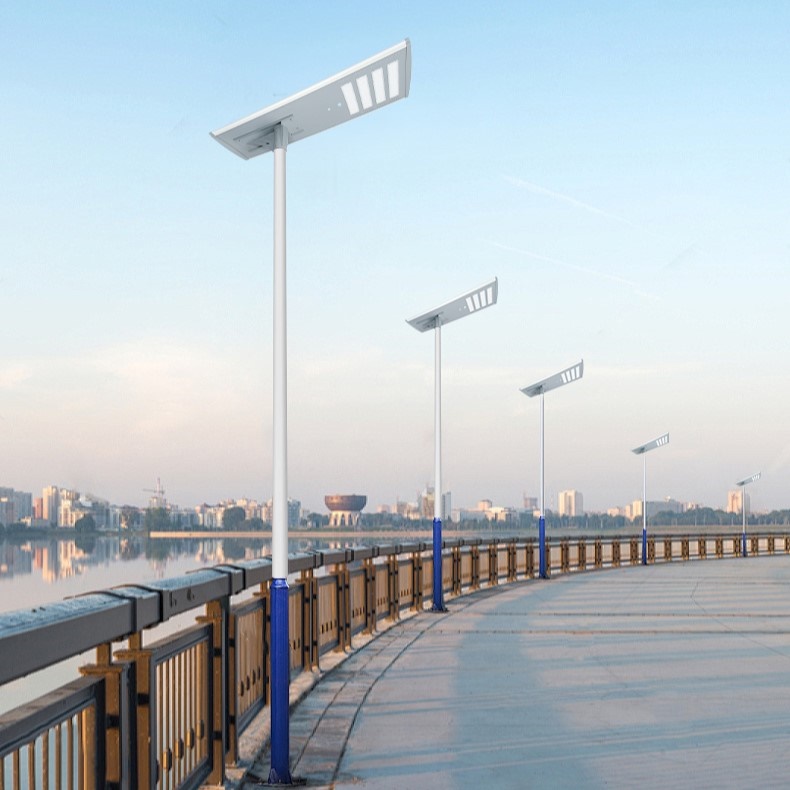With the continuous rise in global energy consumption and the increasing urgency of environmental issues, traditional lighting fixtures are increasingly being replaced by innovative solutions. The solutions for high-efficiency LED solar street lighting have attracted much attention in recent years. These lamps have many advantages, including energy conservation, sustainability and reduced maintenance costs.
What Is High-Efficiency LED Solar Street Lighting?
High-efficiency LED solar street lighting blends LED technology with solar power to create an eco-friendly, energy-efficient solution. These lights use solar panels to capture energy from the sun, storing it for use at night to power the LED bulbs. This process ensures consistent illumination without relying on power grids.
Compared to traditional lighting technologies like sodium or incandescent bulbs, LED lights use less power. By integrating solar energy, these systems significantly reduce reliance on fossil fuels, which helps lower carbon emissions. Even in cloudy weather, solar street lights continue working efficiently, thanks to advanced batteries and intelligent systems.
Key Benefits of High-Efficiency LED Solar Street Lighting
1. Energy Savings and Environmental Impact
The main benefit of high-efficiency LED solar street lighting is its ability to save energy. Traditional lights use electricity from non-renewable sources, which increases energy consumption and environmental harm. Solar-powered LED lights, on the other hand, use clean energy from the sun. This helps lower energy costs and reduce environmental impact.
LEDs themselves consume less power but provide the same, if not better, brightness than older light technologies. Combining LEDs with solar panels creates a highly efficient lighting solution.
2. Reduced Maintenance Costs
Traditional street lights need frequent repairs and replacements. They often require bulb changes, wiring fixes, and energy system upgrades. LED solar street lights, however, are built for durability and long-term use. LED bulbs last up to 50,000 hours, while solar panels and batteries last for many years with minimal upkeep.
These systems are self-contained, meaning they don’t depend on external wiring or power sources. This significantly cuts down on maintenance needs and costs.
3. Improved Safety and Security
The bright, uniform illumination from LED solar street lights enhances visibility on roads and streets. This reduces accidents, deters crime, and makes areas safer for drivers, pedestrians, and cyclists. These lights can be placed in remote areas lacking reliable power grids, further enhancing security in underserved locations.
4. Easy Installation and Flexibility
LED solar street lights don’t require complex electrical wiring or connections to the grid. They are self-sufficient, making installation easier and more affordable. These lights are perfect for off-grid locations or areas with unreliable electricity. Their flexibility allows them to be installed anywhere, from urban streets to rural roads, parking lots, parks, or highways.
Applications of High-Efficiency LED Solar Street Lighting
1. Urban and Residential Streets
LED solar street lights are ideal for both urban and residential areas. In cities, they can improve street safety and traffic flow. In residential neighborhoods, they provide safe and well-lit sidewalks and parks, promoting a better quality of life.
2. Parks and Public Spaces
Parks, playgrounds, and recreational areas often lack access to electricity. Solar street lighting offers a sustainable solution to illuminate these spaces. The eco-friendly nature of solar lighting is well-suited for parks, which prioritize environmental sustainability.
3. Commercial Areas
In commercial settings, LED solar street lights enhance the aesthetic appeal of shopping centers and entertainment venues. These lights improve visibility at night while reducing electricity costs, making them an attractive choice for businesses.
4. Rural and Remote Areas
Rural areas often lack electrical infrastructure. Solar-powered street lights provide reliable illumination in such places. They are a cost-effective way to improve safety and encourage economic development in these underserved regions.
Key Considerations When Choosing High-Efficiency LED Solar Street Lighting
1. Solar Panel Efficiency
The solar panel efficiency directly affects the overall system performance. High-efficiency panels absorb more sunlight, ensuring the lights stay on longer, even during cloudy days. When selecting a solar street light, ensure the panels come from trusted manufacturers known for high performance.
2. LED Light Output
The output of LED bulbs is crucial. Choose lights with high lumen output per watt. This indicates higher energy conversion efficiency and brighter illumination with less power usage.
3. Battery Capacity and Lifespan
Battery capacity is essential for storing enough energy to power the lights overnight. A larger battery means longer operating time during the night, even with less sunlight. The battery’s lifespan also matters. Longer-lasting batteries reduce maintenance needs.
4. Durability and Weather Resistance
LED solar street lights must withstand outdoor elements. Choose lights with a high IP (Ingress Protection) rating. A rating of IP65 or higher ensures protection against dust and water, making the lights durable enough for any weather conditions.
5. Intelligent Control System
An intelligent control system automatically adjusts the light intensity based on the time of day or weather conditions. This system maximizes energy efficiency, reduces energy waste, and increases the system’s lifespan.
How to Maximize the Efficiency of High-Efficiency LED Solar Street Lighting
1. Proper Installation and Orientation
To ensure maximum performance, install the solar panels in areas with the most sunlight. The panels should be oriented towards the sun at the correct angle to capture as much energy as possible throughout the day.
2. Regular Maintenance and Cleaning
Keep the solar panels clean to maintain their performance. Dust, dirt, and debris can block sunlight, reducing the panels’ ability to charge. Regular cleaning ensures optimal energy generation and prolongs the system’s lifespan.
3. Smart Monitoring and Controls
Install smart monitoring systems to track the performance of the lights. These systems can identify issues early, ensuring the lights function properly. Smart controls adjust light intensity based on traffic flow or daylight, further optimizing energy usage.
Conclusion
High-efficiency LED solar street lighting is transforming the way cities illuminate streets. These lights offer significant energy savings, reduced environmental impact, and long-term cost savings. As cities and businesses seek to reduce their carbon footprints and lower energy costs, LED solar street lights are the future of urban lighting.
When choosing solar-powered LED lights, consider factors like solar panel efficiency, LED output, battery capacity, and weather resistance. By making informed choices and optimizing these systems, we can enjoy efficient, sustainable lighting for years to come.
In conclusion, investing in high-efficiency LED solar street lighting means not only better illumination but also a cleaner, greener future for all.


